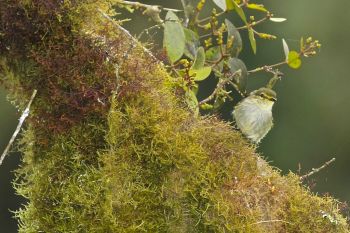Alternative name: Tschudi's Tyrannulet
Includes: Loja Tyrannulet
- Zimmerius viridiflavus
Identification
12 cm.
- Pale yellow loral bands meeting narrowly over bill
- Pale yellow broken eyering
- Bright olive auricular patch washed with buff
- Bright olive upperparts, crown darker olive to greyish-olive
- Dark dusky wings with bright yellow-green edges
- Dusky olive tail
- Pale yellow throat
- Olive-yellow breast and flanks, flammulated with olive
- Bright yellow belly
Sexes similar, juveniles undescribed.
Distribution
Found in Southwest Ecuador and on the eastern slopes of the Andes of Peru (Huánuco to Junín).
An uncommon to fairly common restricted-range species.
Taxonomy

Photo © by lior kislev
La Esperanza, Peru, February 2010
Often treated conspecific with Golden-faced Tyrannulet. Formerly also placed in a separate genus, Tyranniscus.
Subspecies
Two subspecies are recognized[1].
- Z. v. flavidifrons
- Southwest Ecuador (southeast Guayas to western Loja and El Oro) to extreme northern Peru
- Z. v. viridiflavus
- Eastern slope of Andes of Peru (Huánuco to Junín)
Gill and Donsker recognise Loja Tyrannulet, Z. flavidifrons as a separate species[3]

Photo © by Stanley Jones
Buenaventura Reserve, El Oro Province, Ecuador, November 2014
Habitat
Found in humid montane forest and forest edge, also sometimes in second growth.
Occurs at 800-2500 m.
Behaviour
Diet
Feeds on insects. Takes probably also mistletoe and other small berries.
Forages singly or in pairs, often following mixed-species flocks in forest canopy.
Breeding
No information.
Movements
A resident species.
References
- Clements, J. F., T. S. Schulenberg, M. J. Iliff, S. M. Billerman, T. A. Fredericks, J. A. Gerbracht, D. Lepage, B. L. Sullivan, and C. L. Wood. 2021. The eBird/Clements checklist of Birds of the World: v2021. Downloaded from https://www.birds.cornell.edu/clementschecklist/download/
- Del Hoyo, J, A Elliot, and D Christie, eds. 2004. Handbook of the Birds of the World. Volume 9: Cotingas to Pipits and Wagtails. Barcelona: Lynx Edicions. ISBN 978-8487334696
- Gill, F, D Donsker, and P Rasmussen (Eds). 2021. IOC World Bird List (v 11.2). Doi 10.14344/IOC.ML.11.2. http://www.worldbirdnames.org/
Recommended Citation
- BirdForum Opus contributors. (2025) Peruvian Tyrannulet. In: BirdForum, the forum for wild birds and birding. Retrieved 9 May 2025 from https://www.birdforum.net/opus/Peruvian_Tyrannulet




